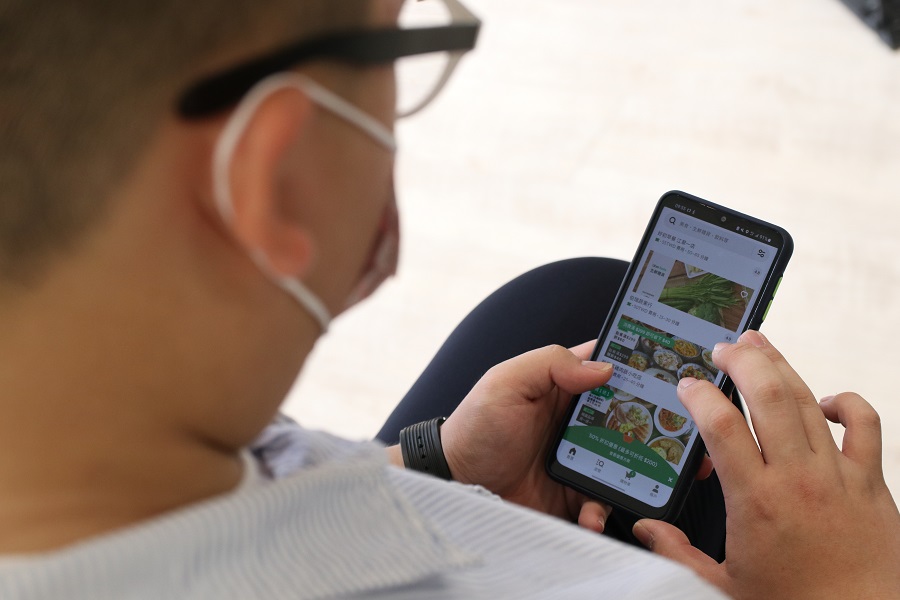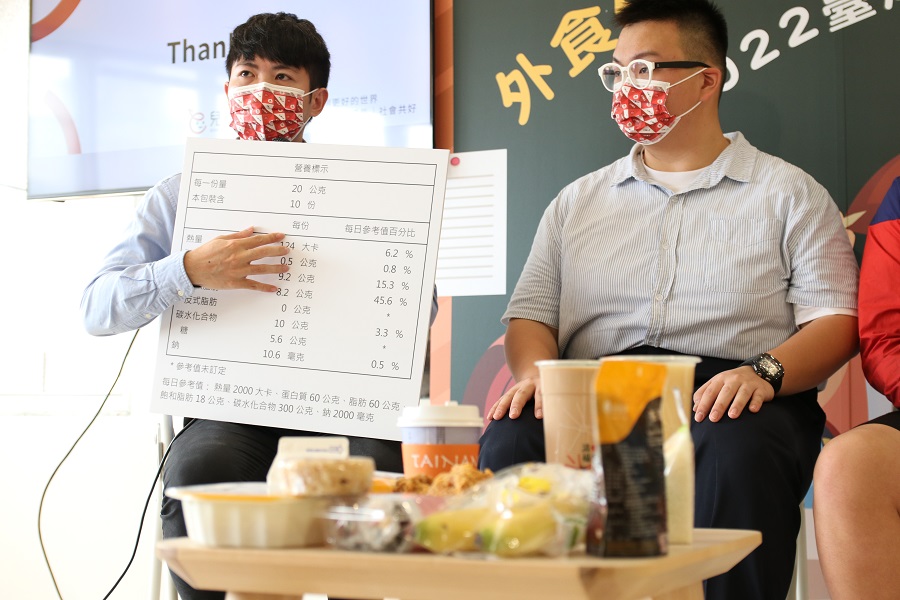
High Sugar, High Fat, And High Calories, Youngsters’ Health Sounded an Alarm
2022-09-25
High sugar, high fat, and high calories diets sounded an alarm to youngsters’ health, food delivery platforms abetting an unbalanced diet
After a long summer vacation, schoolers have certainly gained some height or weight. According to one governmental statistic overweight and obesity rate among primary and middle schoolers, this year was 25.4% and 29.9%. The effect of almost three years of COVID was a significantly lacking outdoor activity and staying at home more than used to; adding on to that, the convenient food delivery platforms made overeating happen more often. As a result, weight issues became another problem during the pandemic era.
Child Welfare League Foundation (CWLF) expressed apprehension that not only for adults, the overweight and obese health issues caused by an incorrect, unhealthy diet among children were also worth concerning. As shown in the “Nutrition and Health Survey in Taiwan (NAHSIT),” not including lunch provided in schools, there was over eighty per cent (82.9%) of children aged 7 to 18 eat out more than seven times a week. To provide flavourful and unique rapid food, most restaurants were serving high fat, high sodium, highly processed food on menus. If not chosen wisely, youngsters would in huge chance expose to too much unhealthy diet during long-term eating out. CWLF published the results of its “2022 Survey on Diet Habits of Taiwanese Middle-Schoolers and High-Schoolers” in the press conference so that we could further understand the current situation of how middle-schoolers diet. Our organisation also invited a well-known dietitian—Red (Su, Cheng-Yu) to share his suggestions on how children who often eat out or order delivered food could choose suitable options and cultivate healthy diet habits. Huang Yun-Hsuan—Director of the branch of organisational operation at CWLF expressed her perspective that having a healthy body is a lifetime treasure for children, and having a nutritious, balanced diet is an essential foundation for such healthiness. For this exact reason, it is crucial that adults take time for themselves and simultaneously accompany children to learn and cultivate the proper perspective toward choosing a healthy diet.

Junk food easily accessible became the top choice for friends’ gathering
74% of youngsters have snacks and desserts once a week; over 80% drink handmade beverages often
Having a piece of crispy and juicy fried chicken chop with a cup of icy cold pearl milk tea (milk tea with tapioca balls) is the most appreciated guilty pleasure of the day, as well as one of the top late-night snack choices in Taiwan, no matter for children or adults. CWLF found that all junk food with high fat or high sugar content was terribly easy to get for children, (33.4%) children could get it whenever they were hungry or felt like having some snacks, snacks were also a must-have for some (43.4%) when gathering with friends. A survey revealed that over seventy per cent of children (74%) have snacks or desserts at least once a week; both the percentage of those who buy sugary beverages (62.7%) or deep-fried goods (42.2%) was higher than forty per cent. Moreover, nearly a quarter of children (24.2%) have unhealthy food (snacks, desserts or sugary beverages) daily.
Furthermore, no matter whether in urban regions or rural townships, handmade beverages that could be found almost everywhere became the top choice for schoolers (79.9%), this number was more than double the schoolers taking other options, such as instant beverages (36.7%), flavoured milk (35.4%), soft drinks (35%), and juice (33.6%). This habit of having handmade beverages as if drinking water had led to children ingesting an extra-large amount of caffeine. According to the suggestion of the Canadian government, the maximum caffeine intake of youngsters aged 12 to 18 is 2.5 milligrams/per kilogram of body weight. Based on the average weight of Taiwanese teenagers aged 16 to 18 weighing 61.8 kilograms, the suggested caffeine intake is approximately 154.5 milligrams a day. However, the caffeine content in only one cupful of the handmade drink was 120 to 160 milligrams. Taking such a high amount of caffeine in the long term could cause palpitations, insomnia, abnormal growth hormone secretion, anxiety, inability to concentrate and other symptoms, and even damage one's brain. Concerning enough, the survey showed that about ten per cent (10.8%) of youngsters told that they drink alcoholic drinks often. In most scenarios where they can get access to drinks at special festival events (58.3%), being invited by friends or classmates (40.7%), and sometimes older relatives in the family would also encourage them to do so (40.3%), regardless the fact that alcohol could have several negative effects on youngsters.

Students eat out for all three meals; food delivery increased the chance in disguise of eating out
35% of youngsters supper out, over half of whom would take snacks or beverages instead meals
Considering that schoolers in a high percentage had no other choice but to have lunch at school, CWLF conducted a survey focused on situations of children dining out, which showed that nearly thirty-five per cent (34.7%) of children usually supper out. If we further discussed the content of the supper last night, almost twenty per cent of children responded not having a balanced meal and missing some nutrients including whole grains (16.4%), meat, fish, milk, and eggs (19.4%), and there were over thirty per cent (31.2%) responded not having vegetables; a surprising number of almost sixty-five per cent (64.4%) did not have fruits. The statistics indicated that a huge part of students had an unbalanced diet for supper. Another alarming result was that over half (53.4%) of children expressed that they would take snacks or beverages as a meal. The reasons for their choice were not being hungry (67.7%); too tired to have a proper meal (37.4%); wanting to save money (27.2%), and nearly a quarter of children (24.8%) explained that snacks and beverages were easier to get comparing to a proper meal. Not having a balanced diet resulted in the group of students who often supper out suffering from constipation or tend to be shorter than average.
The rising food delivery platforms and the more convenient way to order delivered food at home contributed to the higher frequency of children ordering food from outside instead of meals prepared at home. Statistics showed that 33% per cent of youngsters ordered delivery food more than twice a week, and seventy per cent of which were for a proper meal (72.9%), however, there were also lots of them just ordering handmade beverages (55.5%); snacks (41.2%), or deep-fried goods (31.4%). An investigation found that those who ordered delivery food and beverages more than twice a week had more greasy food and sugary drink, and was more likely to have problems with sleeping or constantly feeling fatigued and sleepy.

Incorrect dieting concepts hinder children from healthy develop
Director Huang Yun-Hsuan expressed her observation that schoolers spend at least ten hours out to study, making eating out inevitable, therefore eating healthy food even when eating out is utterly crucial. The survey discovered that youngsters chose the food based on the following factors: being delicious (87.1%); familiarity with the food (66.7%); easy access to the food (53.3%). And the food being healthy (39.3%) only came fifth on the list. The other alarming fact was that youngsters liked to go on a diet to lose weight as much as adults, and over fifty per cent of youngsters told that they had experienced losing weight through dieting or fasting. Although they cautiously avoided sugary beverages, they would still intentionally eat less (61%), skip a few meals (20.3%), or eat only a specific food to lose weight. Through further analysis of those who skipped meals to lose weight, eighty per cent (80.6%) of them only bought snacks or beverages to satisfy hunger. However, when children were still growing up, without the right concept to obtain balanced nutrition, physical developments were not ideal and indirectly led to alarming health conditions.
Homemade supper is more balanced in nutrition and parents who like eating junk food lead to their children do the same
The formation of diet habits in children had a lot to do with the parents. Throughout this survey, we noticed that families who made supper at home had higher portions of vegetables in meals than those who often eat out; the chances of having deep-fried, desserts, and snacks were lower than others as well.
On the other hand, as we cross-examined the parents’ diets with their children's diets, we found that the more frequently parents ate fried food, desserts, and sugary beverages, the more possible that their children would do the same. Chances were two to three times more frequently than those children whose parents had less of those kinds of unhealthy diets. The result was convincing that parents played a crucial role in cultivating the diet habits of their children.
Regarding Taiwanese children often having a full schedule with after-school or off-campus talent classes, eating out had become an inevitable trend. In the press conference today three local senior high-school representatives Pei-Zhen, Chen-Rui, and Kang-You mentioned the same viewpoints without prior consultation that very often they would buy snacks after school from being hungry, adding that the fully scheduled after-school classes or school clubs events resulted in that, rice balls, salted fry chicken, braised dished, fried rice, and fast food etc. became the top choices for students such as themselves to quickly gain strength and those snacks inevitably, had ice creams and handmade beverages as a companion.
The dietitian Red elaborated that noodles, handmade beverages, and ice…were high in carbohydrates; fried goods were processed with high-temperature oil, frequently having those products that were high in fat and carbs and at the same time lacked good protein and vegetables, poor diet such so could easily lead to obesity, inattention, lethargy, and unbalanced nutrition, which were the exact opposite of expectation. On the options when eating out, Red suggested braised dishes or brined chicken, with a couple of vegetables, a lean meat dish or a soy-bean dish (tofu or dry tofu), if worried that it is too high in sodium one could ask the shop to only season dishes lightly. Healthy Bentos provided in lots of convenience stores were also a good option since the recipes were often researched and developed by various dietitians.
For snacks and late-night snacks between meals, the dietitian indicated that for children growing up, it is perfectly normal to feel hungry more often, he advised youngsters to choose healthier food for instance fruits, milk, soymilk, yoghurt, oatmeal bars, or tea eggs, most of which were accessible at a convenience store, they are fulfilling and not causing too much burden for your body, and parents could help prepare those in advance as well. In addition, nearly all food sold at convenience stores was labelled with nutrition facts, and the total calories and sugar content were the most important ones. For middle and senior-high schoolers the total calorie intake should be between 2000kcal to 2500kcal. A pack of chips is 350kcal; a cup of handmade drink is approximately 650kcal. These products made children unable to have their meals properly and could easily cause obesity even. Furthermore, the refined sugar in desserts and beverages, as well as the sodium content were the details that ought to be careful with. Sometimes the calorie labelled did not seem like a lot, but the whole pack contained twenty portions, meaning the total calorie is twenty times which labelled. If one could pay more attention to the nutrition facts label on the packet, eating out healthily could be approachable.
When it came to dieting matters, the youth representative Pei-Zhen shared her own experience that her body weight spiked when she went to senior high school. Even though she was eager to lose weight, the guidance online often suggested eating low-calorie food would stop her from getting more weight, such as salad with chicken breast, which happened to be something she did not prefer. To this issue the dietitian explained that refined sugar and deep-fried food were the two key factors causing obesity, however, having someone completely turn down those, would take away one great pleasure in life, and therefore we needed to adjust our diet plans accordingly. For example, choose sugar-free milk tea with fresh milk or only thirty per cent sugar (compared to the unadjusted version), and cut down the frequency from daily to once to a maximum of thrice a week; when choosing meals at fast food restaurants, select the non-fried main courses, for instance choosing roasted-chicken burger over the fried-chicken burger. And water also played an important part, drinking enough water which is equivalent to thirty times millilitres of your body weight could satisfy hunger and delay your urge to eat, and invisibly control one's calorie intake and achieve weight loss. Lastly, one popular dieting plan was the Starch Solution Diet, it often confused people, causing them to miss several crucial minerals and vitamins contained in starch food such as rice or sweet potatoes, and later led to an unbalance of nutrition. Moreover, not having proper meals was only a way to short-time weight loss by triggering calorie intake unbalance, the weight would get back up once the person got back to the old casual diet, so understanding how nutrition work and setting up a diet plan without the need to starve was the real effective way to make weight loss.
Handmade beverages which slipped into the life of almost every Taiwanese had become even more accessible for students with the help of delivery platforms. Red considered that the sugar-sweetened beverages on the market nowadays were made with high-fructose corn syrup, which is metabolised by the liver. In the long term, constantly drinking beverages containing this syrup could cause fatty liver or other metabolic diseases. Students were commonly under tremendous academic pressure, although drinking sugary beverages could provide short-term satisfaction, which might be replaced by inattention and lethargy, affecting emotions and studying proficiency. Another youth representative mentioned that he would usually get a coffee before school, and another one after after-school classes to boost his energy to keep studying. About this, added the dietitian, the recommended maximum daily caffeine intake for an adult is 300 milligrams, which is approximately the equivalent of one large-size hot americano; as for adolescents there was yet a regulated amount, however for the sake of health matters, it was recommended to have only 150 milligrams per day. An overdose of caffeine could cause excessive secretion of gastric acid, trigger tension and anxiety, and would also lead to a loss of calcium, it might be a better choice to drink flavourful ginger tea or mint tea instead of coffee. Also, a good exercise routine would help to build up your energy and prevent fatigue.

Director Huang emphasised once again that diet is the foundation of the healthily developing of children and youths, CWLF urged parents, schools, and related parties to be aware:
- Parents to cultivate healthy diet habits, and have meals with children weekly so they will not become picky eaters
As children cultivated basic recognition for diet plans largely from their families, despite busyness at work making eating out inevitable and eating at home less manageable, parents should arrange some time to have meals with their children as much as possible. Pay attention to children’s diet habits and give productive advice when the deviations happened, so they would not become picky eaters, thus taking too much unhealthy food.
- Schools should provide schoolers with more varieties of healthy food choices
At present, “The Scope of Beverages and Snacks on Campus” is strictly regulating snacks sold in schools under the middle school level, on the other hand towards high schoolers it would be better to promote healthier snacks rather than limiting unhealthy ones. So far, some schools hired dietitians to examine the food sold in the food court and shops on campus, this was a promising approach that ought to be further promoted. Furthermore, schools were responsible to provide more healthy food options and clearly labelling their nutrition facts or designing discount combos for healthy food, hence encouraging youngsters to choose healthier food.
- Food delivery platforms to be regulated with mandatory beverages nutrition labelling
On account of the “Labelling Regulation for On-Site Prepared Beverages in Chain Stores, Convenience Stores, And Fast Food Businesses” will be put into practice on 1st January 2023, beverages sold at businesses listed have to be labelled with total calories, total sugar content, and total caffeine, to notify consumers with ingredients ingesting before purchasing those beverages. While food delivery platforms were yet to be included in the range of the regulation, CWLF urges these platforms to initiatively label the nutrition facts to prevent youngsters from intaking excessive sugar and caffeine.


